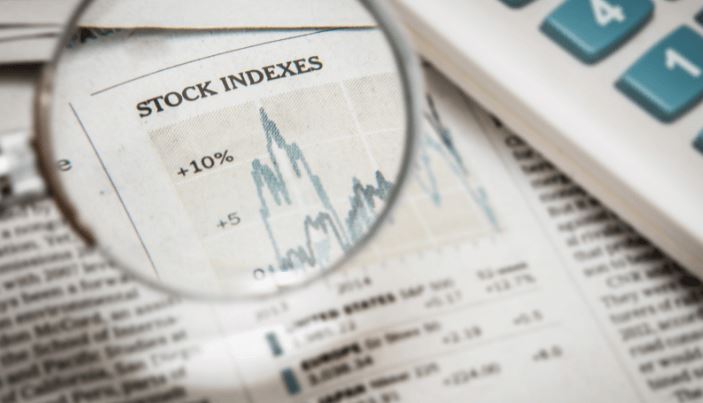Vantage uses cookies that are essential for our website to work. We also use optional analytical cookies to help us to improve our website and the services, content and ads we provide to you which you can accept or reject here. Please see our Cookies Policy for more information on how we use cookies.
CFDs and Spread Bets are complex instruments and come with a high risk of losing money rapidly due to leverage. 73.5% of retail investor accounts lose money when trading CFDs and Spread Bets with this provider. You should consider whether you understand how CFDs and Spread Bets work and whether you can afford to take the high risk of losing your money. Please seek independent advice if necessary.
Stock Indices: What Are They And How To Trade Them

When describing the markets, we might hear of popular phrases like “the market has surged higher” or “stocks tumbled to new lows” when reading and listening to news reports. But what does “the market” and “stocks” mean and specifically what market do news media generally refer to?
Most people talk about stock indices when they discuss “the market” and arguably a stock index is also the most popular instrument to trade [1]. The Dow Jones, Nasdaq and Dax have become part of our everyday language even if little else is known about these markets. With the growing importance of stock markets in western society, let’s dive into the world of stocks indices.
What is a Stock Index?
A stock index is an index that tracks the price performance of an underlying group of company shares on a given stock exchange. Trading indices allows you to get exposure to that group, or sector or country’s top companies in one trade in a single position.
Some well-known and most traded examples of major market stock indices include:
- DJ30 – The Dow Jones Industrial Average measures the value of the 30 biggest blue-chip companies in the US. It was created in its original form by Charles Dow in May 1896. The index is price-weighted unlike others which use market capitalisation.
- Nasdaq 100 – This relatively newer index details the market value of the 100 largest non-financial companies in the US. The index is dominated by tech companies and well-known names like Apple and Amazon.
- S&P500 – This index reports the value of 500 large cap companies in the US and is seen as the blue-chip benchmark for stock market indices.
- Dax 30 – The Dax Germany 30 tracks the performance of the 30 largest companies listed on the Frankfurt Stock Exchange.
How do Stock Indices differ from other indices?
Stock indices are trackers of numerous well-known and sometimes less common companies which move in points. They will reflect the prices of all the underlying assets and may be equally weighted or biased towards larger stocks.
Price-weighted indices like the Dow Jones Industrial Average give greater importance to higher priced shares. Those indices weighted by market capitalisation will move more by larger cap companies.
Other well-known indices include the Dollar Index (DXY), which measures the value of the dollar against a basket of six other currencies used by the major trade partners of the US. The euro dominates the basket with a weighting of around 57.6% [2].
The VIX is a real-time index representing market expectations for volatility in the S&P 500. Known as the Wall Street “fear gauge”, it is derived from the price of index options over the next 30 days. Volatility is often seen as a way to gauge market sentiment.
Why trade a Stock Index?
Stock indices are highly liquid and follow stock market exchange trading hours. As the index is a basket of numerous companies or industries, you are exposed to market movements of the entire market in a single position. You do not need to open multiple trades and could benefit from moves in the most important stocks in the sector or country traded on the exchange.
You can also trade the ups and downs of stock indices via a derivative product like Contracts for Differences (CFDs). CFDs enable you to gain exposure to the market by speculating on the price movements of an underlying asset, such as a stock index in this case, without actually owning the asset.
Here are some advantages of trading stock indices CFDs:
- Stock index CFDs are leveraged products that are traded on margin, which means you can open a live position with a much larger market exposure than your initial deposit. However, leveraging is a double-edged sword which can increase profits if the market moves in your favour, it can also magnify losses if the market moves against you.
- Index trading with CFDs allows you to go “long” when you think prices will rise or “short” when you believe the index price will drop, giving you the flexibility to seize trading opportunities in varied market conditions.
- When trading a CFD, the cost you incur would be the spread — the difference between the buy price and the sell price. This cost can be far lower than the cost you’d incur when you directly purchase to own a unit of the index, which could incur not just commission fees, but also custodian fees.
- Trading CFDs also gives traders the opportunity to gain global exposure to a variety of markets, such as indices in different stock markets, across different geographies and industries.
How to trade a stock index using CFDs?

Derivatives like CFDs, short for “contract for difference”, are margined products that track an underlying asset. This means you are only required to put up a fraction of the full contract as margin to open a position on the underlying asset.
- It is always wise to have a risk management plan in place before you open live positions. This should include using stop loss orders and take profit limit orders. You will then know how much risk you have in the market at any point in time.
- Try and pick a stock index that suits your individual appetite for risk and trading style. Some indices like the broad-based S&P 500 can historically offer steadier returns, while others are more volatile like the Dax 30.
- You can now choose if you want to go long or short against the stock index. For example, if you think the tech sector of the US economy looks attractive, you might go “long” on theNASDAQ-100 Technology Sector Index (NDXT).
However, it’s important to learn that CFDs are high-risk financial instrument due to leverage. You are encouraged to do your own research and understand all the risks involved. To start trading indices CFDs, you can open a live account with Vantage to access global markets. Alternatively, you can opt for a demo account instead, to practice your trading with virtual money. Beyond trading stock indices with CFDs, you can also trade other products classes such as forex, commodities, gold, ETFs and more with Vantage.
Reference
- “The Lowdown on Index Funds – Investopedia” https://www.investopedia.com/investing/the-lowdown-on-index-funds/ Accessed 27 Jan 2023
- “What Is the U.S. Dollar Index (USDX) and How to Trade It – Investopedia” https://www.investopedia.com/terms/u/usdx.asp Accessed 16 Jan 2023
Disclaimer
Vantage does not represent or warrant that the material provided here is accurate, current, or complete, and therefore should not be relied upon as such. The information provided here, whether from a third party or not, is not to be considered as a recommendation; or an offer to buy or sell; or the solicitation of an offer to buy or sell any financial instruments; or to participate in any specific trading strategy. Any research provided does not have regard to the specific investment objectives, financial situation and needs of any specific person who may receive it. We advise any readers of this content to seek their own advice. Past performance is not an indication of future results whereas reference to examples and/or charts is solely made for illustration and/or educational purposes. Without the approval of Vantage, reproduction or redistribution of this information is not permitted.
Latest Releases
-
How to Buy Bonds in the UK
Bonds are a popular debt instrument that can offer capital gains, steady income or potential to profit from speculation. Here’s …
-
Forex Broker UK – All You Need to Know
Forex brokers offer retail investors in the U.K. speed, convenience and cost savings for global forex trades. Here’s what you …
-
Top 5 UK Stocks to Buy in 2023
From aviation to banking and property development, we picked five best U.K. stocks listed on the London Stock Exchange to …
-
Apr 08,2024
AI and Reactivity – How AI Can Enhance Trading News Reaction Times
Explore how AI transforms trading news response times, ensures swift reactions, and mitigates risks in the fast-paced financial markets.
-
Apr 08,2024
The Psychology of Market Reaction: Understanding Investor Behaviour
Explore the psychological dynamics influencing investor behaviour and market reactions, unveiling the role of cognitive biases and emotions in financial decision-making.
-
Apr 02,2024
Understanding Central Bank Policies: How They Influence the Economy and Market
Discover how central banks influence global economies through policy while examining their evolving strategies in line with technological advances.









